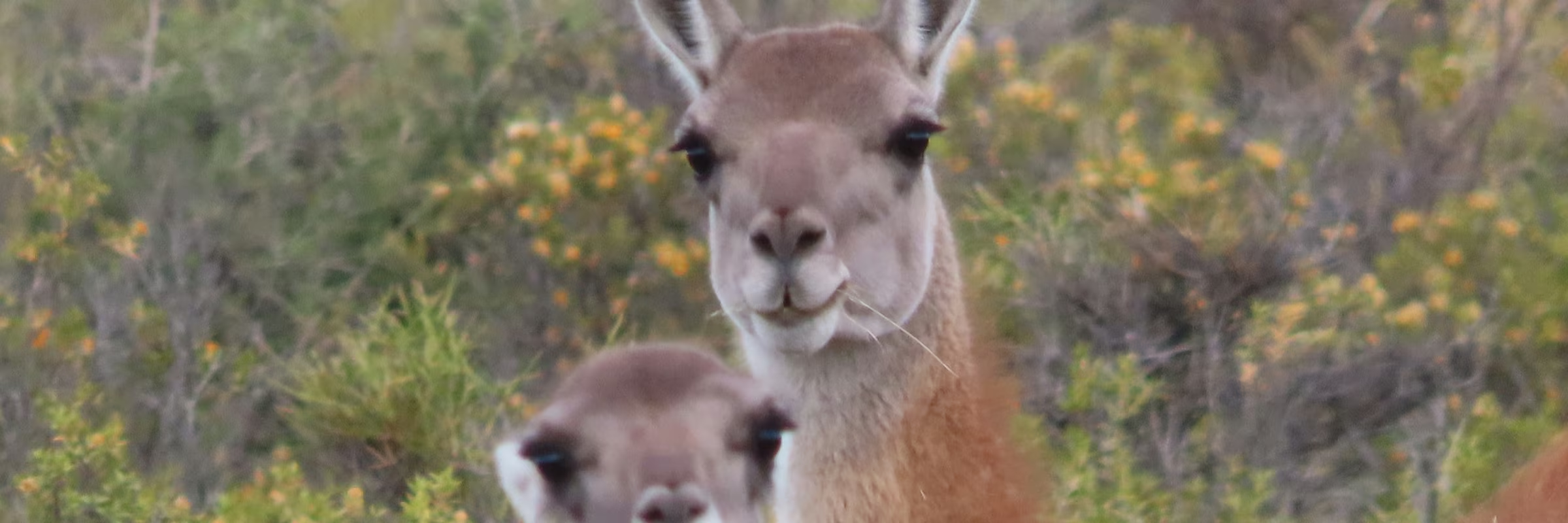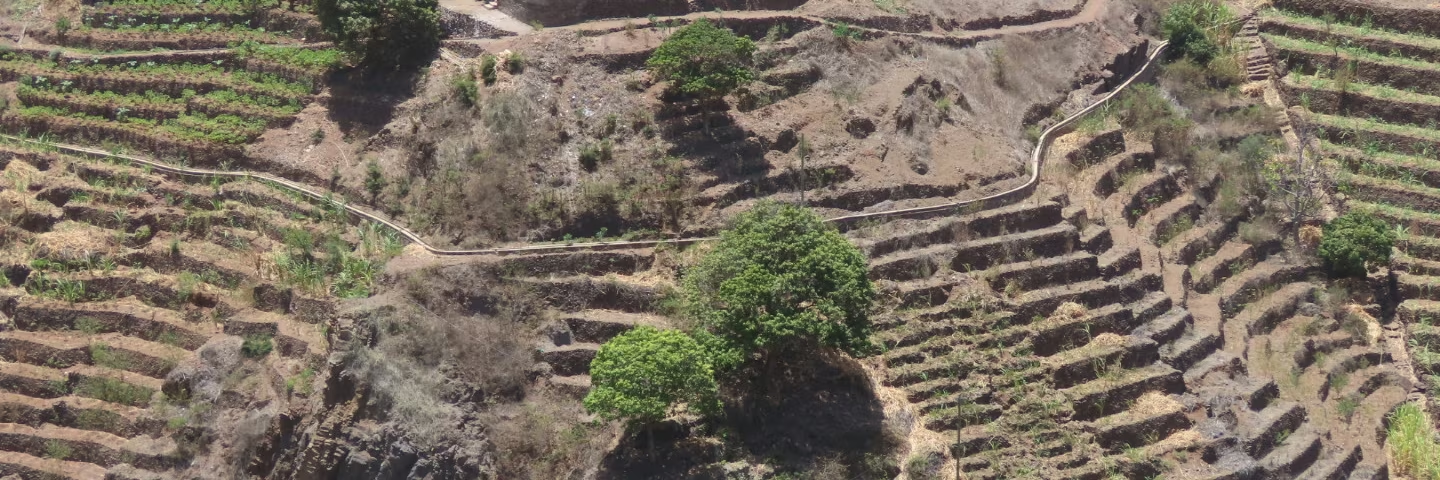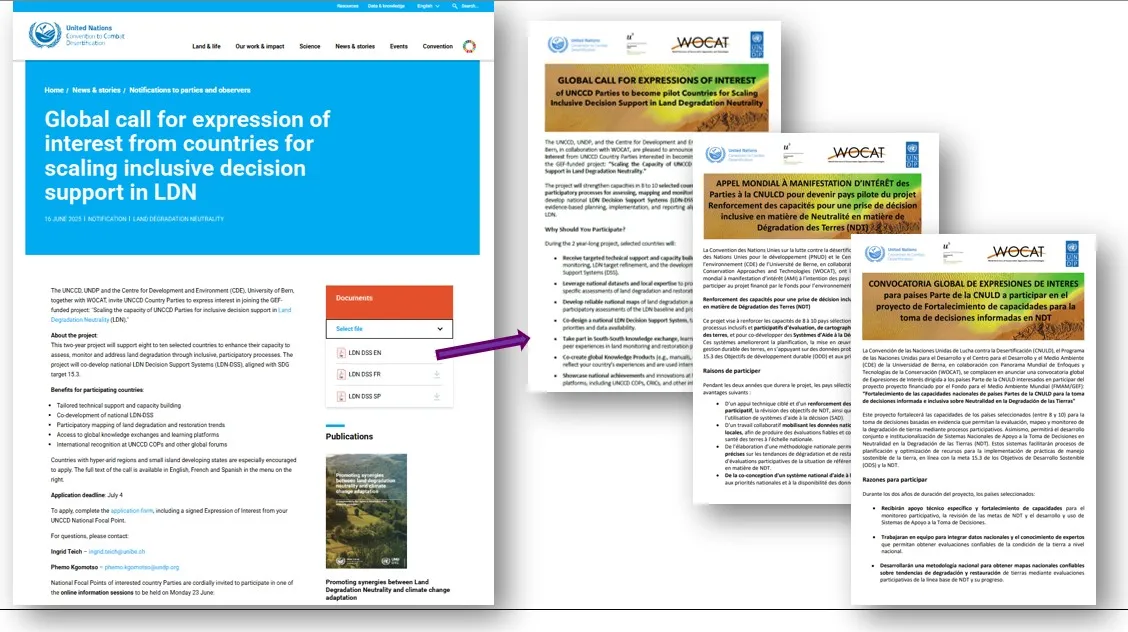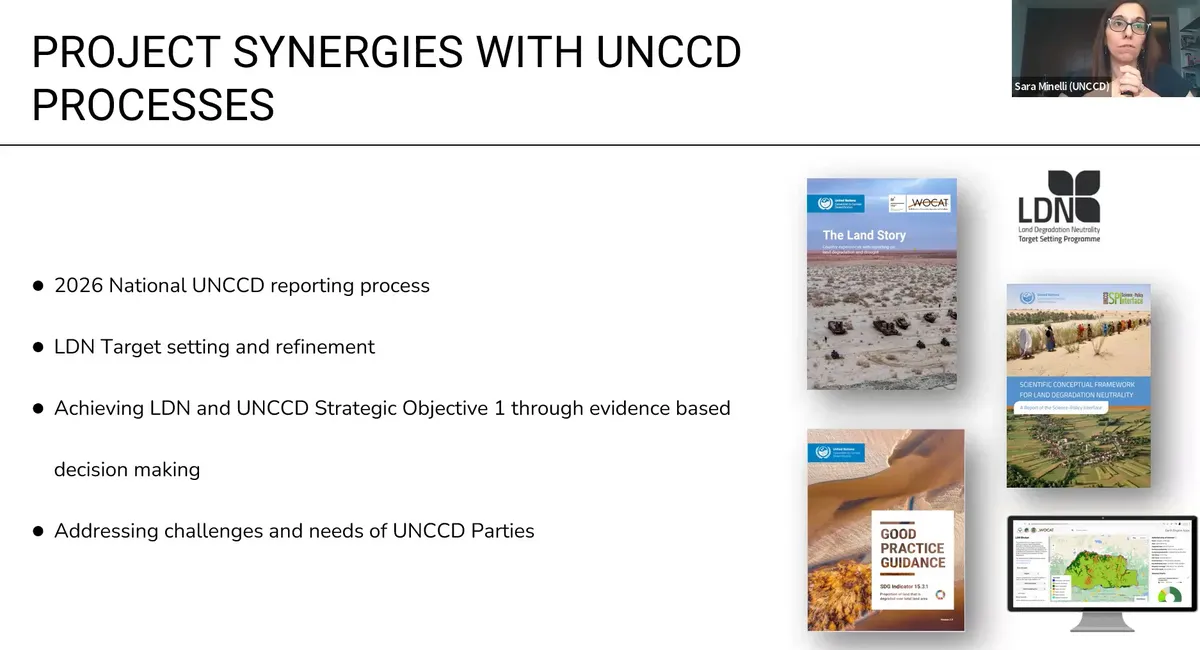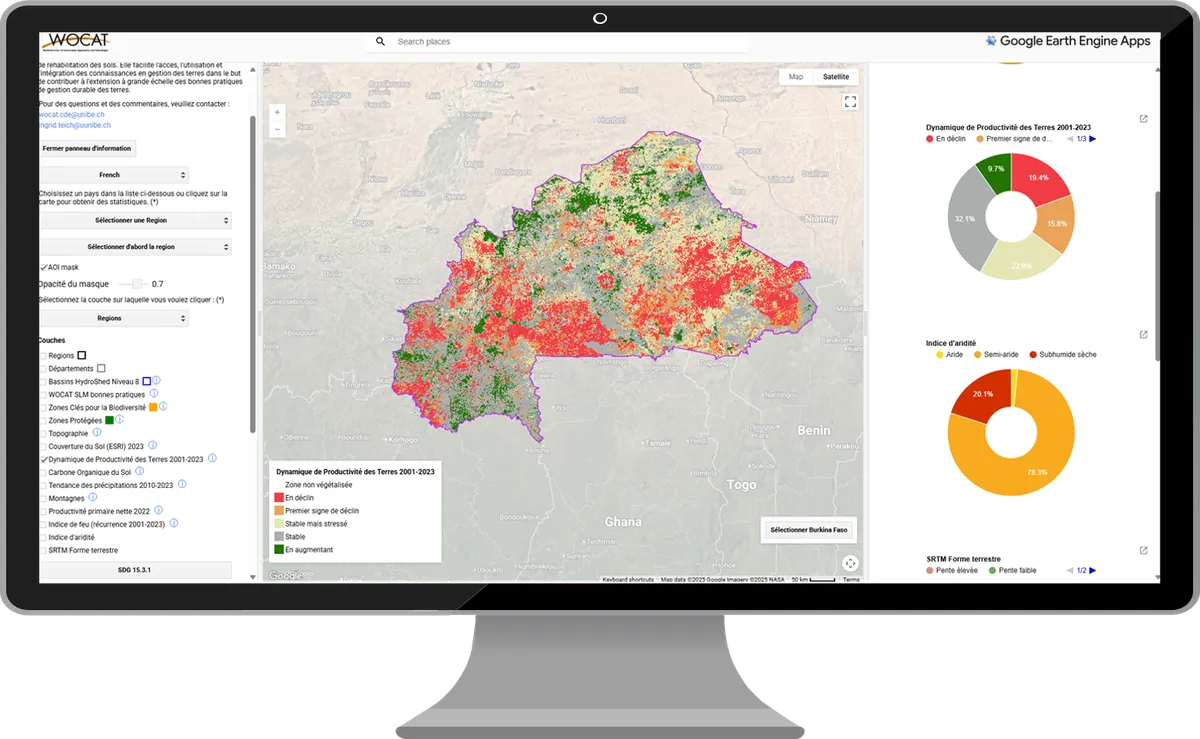Scaling the Capacity of UNCCD Parties for Inclusive Decision Support in Land Degradation Neutrality
This GEF funded project will strengthen capacities in 8 to 10 selected countries to implement inclusive and participatory processes for assessing, mapping and monitoring land degradation and to co-develop national LDN Decision Support Systems (LDN-DSS). These systems will enhance evidence-based planning, implementation, and reporting aligned with SDG target 15.3 and LDN. The project will be implemented by UNDP and executed by CDE, University of Bern.
- Home
- Scaling the Capacity of UNCCD Parties for Inclusive Decision Support in Land Degradation Neutrality
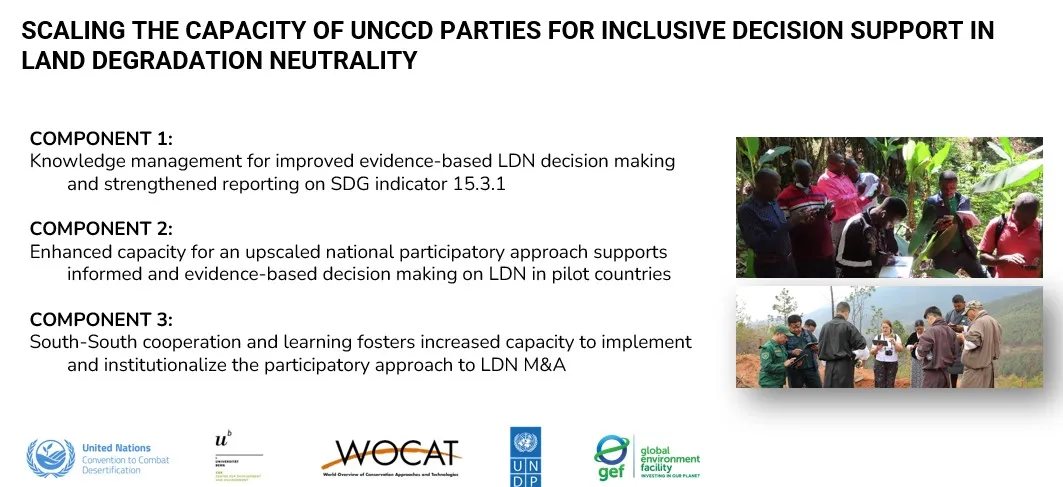
Background
Mapping land degradation (LD) is imperative to achieve Land Degradation Neutrality (LDN), target 3 of the Sustainable Development Goal (SDG) 15 “Life on Land”. To reach a status of no net loss of productive land, it is necessary to estimate the effects of land use and offset projected losses by rehabilitating or restoring areas of the same land type. In this process, mapping and quantifying LD is crucial to spatially identify, and strategically plan actions to counterbalance LD. To achieve this, meaningful national or sub-national datasets and knowledge coupled with a participatory approach are needed to validate results from Earth Observation (EO) analysis. Integrating expert knowledge has advantages over only relying on satellite-derived data, as it provides a more comprehensive assessment that includes drivers and types of LD, along with recommendations for applying Sustainable Land Management (SLM). Once LD is mapped, it is crucial to facilitate open access to resulting maps and products in a transparent and easy-to-use way, so stakeholders can base their decisions on reliable evidence. Moreover, facilitating integration of additional indicators that provide information on socio-economic characteristics, biodiversity, climate and other datasets is key to making informed decisions that optimize investments and achieve LDN.
The project
The overall goal of the project is to strengthen the capacity of UNCCD country Parties to assess, plan, implement, monitor and report LDN through inclusive decision support. The specific objectives are to:
- Scale up the successful participatory approach realized with six countries during the 2022 Reporting to map LD, estimate SDG indicator 15.3.1, refine LDN targets, and plan LDN interventions to avoid, reduce or reverse LD through suitable SLM good practices.
- Build capacities for the co-development and sustainable use of LDN-DSS, particularly in regions with specific challenges, and facilitate the integration of local/landscape/national data to allow a national-to-global as well as national-to-local use of LD evidence both for reporting as well as integrated land use planning.
- Enable South-South exchange and learning on LDN with focus on lessons learned under objectives 1 and 2.
To achieve these objectives the project will work on 3 components:
Component 1: Knowledge management for improved evidence-based LDN decision making and strengthened reporting on SDG indicator 15.3.1.
A "light" capacity needs assessment engaging focal points and other relevant actors will provide the basis for identification of relevant learning materials to be co-produced. These will include training materials (both written and audio-visual), tutorials, and guidelines in all UN languages for the co-development of the LDN-DSS, based on existing case studies. Countries will be invited to co-author the learning materials. Targeted dissemination will take place through the portals, platforms and channels of participating organizations and countries.
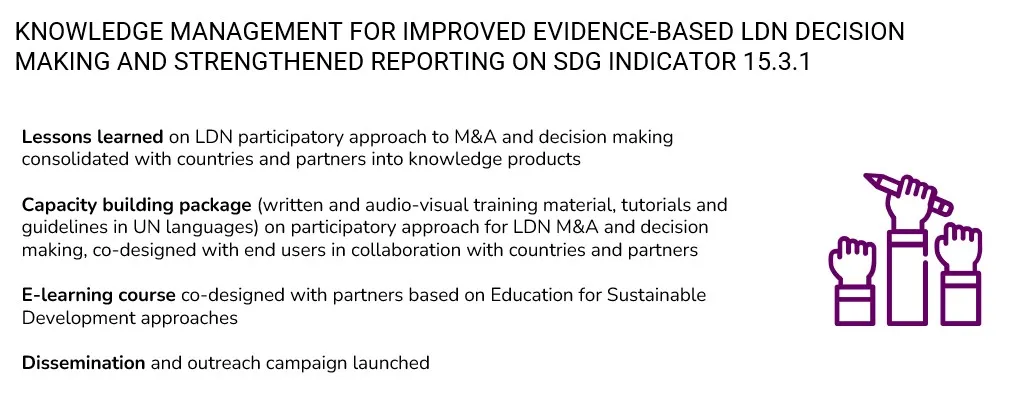
Component 2: Enhanced capacity for an upscaled national participatory approach supports informed and evidence-based decision making on LDN in pilot countries.
Through targeted technical support and co-development processes, this component will empower 8-10 selected countries to implement participatory land degradation assessments. The approach enhances the integration of national and local knowledge to guide the development of tailored LDN Decision Support Systems (LDN-DSS) and improve alignment of LDN targets with national priorities. A core team will be formed, comprising experts from different regions and covering all UN languages, including individuals from countries with prior experiences on participatory LDN processes, members of the WOCAT network, and experts involved with the UNCCD STI. This team will undergo comprehensive training through a Training of Trainers program, with the goal to championing and advancing the participatory approach. At regional level, regional/national institutions (e.g. universities, national research institutes, NGOs, CSOs) will be identified to act as representatives and collaborate with the core team to play a leading role for capacity development and ensure long-term sustainability.
Selected countries will identify national experts to join capacity development activities implemented by the regional representatives. The participatory approach will be implemented and the LDN-DSS co-developed in the selected countries, serving as examples for other countries facing similar challenges. As a result, knowledge products (maps, area estimations, etc.) fully compatible with UNCCD SO 1 reporting in PRAIS will be produced, to guarantee their use in planning and implementing LDN interventions.
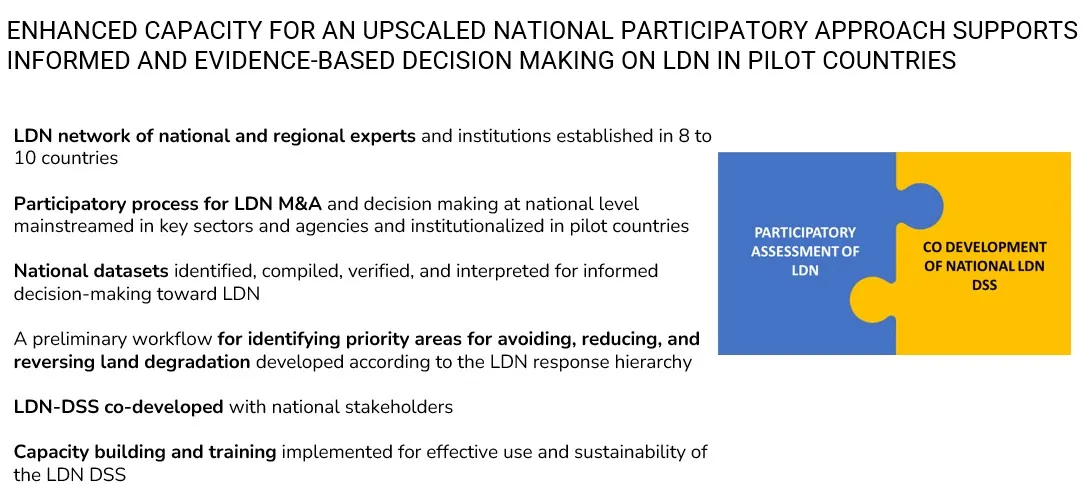
Component 3: South-South cooperation and learning fosters increased capacity to implement and institutionalize the participatory approach to LDN monitoring and assessment
South-South cooperation (SSC) activities including South-South exchange workshops and learning events (online and physical) focusing on the process, challenges and results will be organized amongst 8-12 participating countries and other interested non-participating Parties and actors. SSC activities will focus on regional exchange, global exchange as well as be dedicated to specific topics or ecosystems (e.g. SIDS, hyper-arid areas, inclusion of indigenous people). Demand for SSC from different stakeholders will be assessed throughout the process to facilitate the scaling up of project processes, learnings and expertise. Learning opportunities will also be explored and complementarities enhanced with other LDN capacity building and technical assistance projects and initiatives, where relevant, e.g., other GEF-financed enabling activity and global support programs and SLM and LDN projects implemented by FAO, UNDP, UNEP, IUCN, CI, among others.
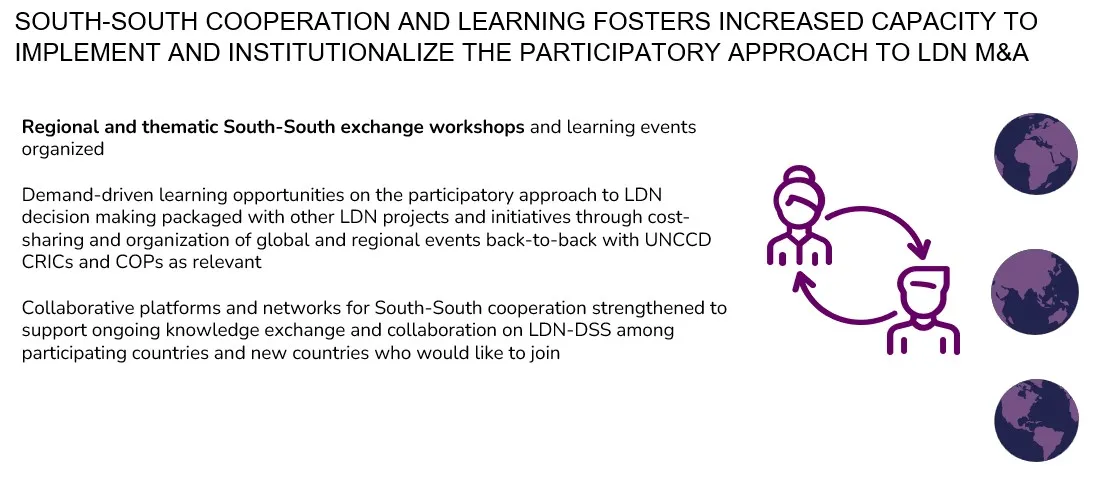
Role of WOCAT-CDE
As the executing partner of the project “Scaling the capacity of UNCCD Parties for inclusive decision support in Land Degradation Neutrality”, CDE leads its implementation and coordination. CDE draws on decades of experience in sustainable land management and participatory knowledge co-production. The project builds on previous efforts led by WOCAT -CDE to strengthen countries’ capacities for monitoring land degradation and scaling sustainable land management (SLM) practices through evidence-based tools and participatory approaches.
Specifically, WOCAT-CDE will:
- Coordinate all project components and partnerships, ensuring coherence and impact at national, regional, and global levels.
- Guide the development and application of participatory approaches to assess land degradation and refine LDN targets in selected countries.
- Lead the co-development and scaling of Land Degradation Neutrality Decision Support Systems (LDN-DSS), ensuring they integrate national, local, and global data for informed planning and reporting.
- Support capacity development through the creation of multilingual training materials and a Training of Trainers (ToT) programme, leveraging the WOCAT network.
- Facilitate South-South learning and cooperation to enable knowledge exchange on LDN assessments, inclusive decision-making, and SLM implementation.
National Focal Points of interested country Parties are cordially invited to participate in one of the online information sessions to be held on Monday 23 June:
- Webinar 1 (English and French) 11:00 AM CEST: https://unibe-ch.zoom.us/meeting/register/4438c0d9SvOoFXa88xRvEQ
- Webinar 2 (English, French and Spanish) 4:00 PM CEST: https://unibe-ch.zoom.us/meeting/register/Dc-ISTtCSA2jM0N54aszqQ
Apply now!!
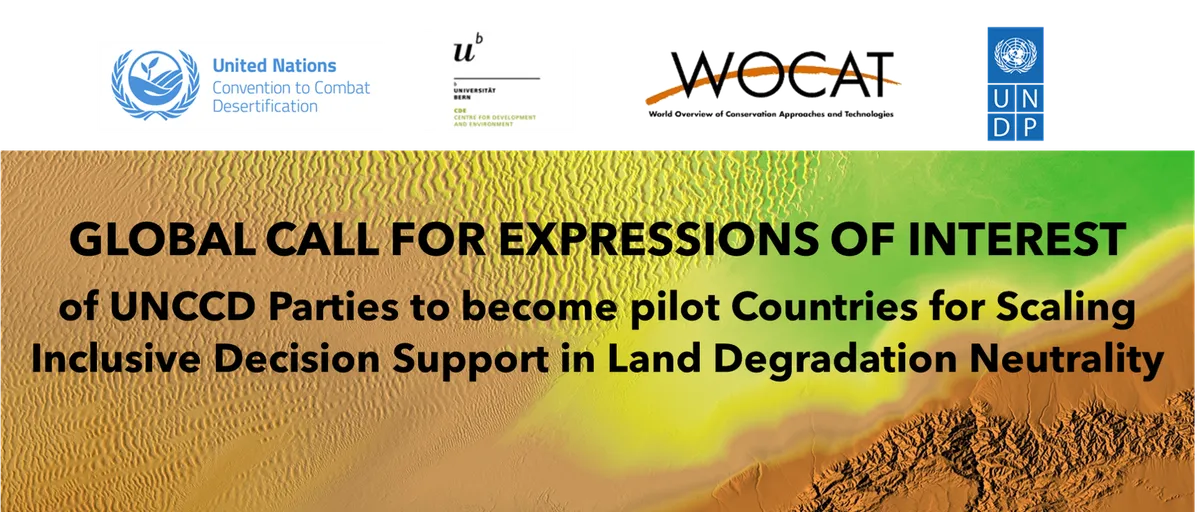
The UNCCD, UNDP, and the Centre for Development and Environment (CDE), University of Bern, in collaboration with WOCAT, are pleased to announce a global Call for Expressions of Interest from UNCCD Country Parties interested in becoming participating countries under the GEF-funded project: "Scaling the Capacity of UNCCD Parties for Inclusive Decision Support in Land Degradation Neutrality."
Why should your country participate?
During the 2 year-long project, selected countries will:
● Receive targeted technical support and capacity building to strengthen participatory monitoring, LDN target refinement, and the development and use of Decision Support Systems (DSS).
● Leverage national datasets and local expertise to produce accurate and context-specific assessments of land degradation and restoration.
● Develop reliable national maps of land degradation and restoration trends through participatory assessments of the LDN baseline and progress.
● Co-design a national LDN Decision Support System, tailored to your country’s priorities and data availability.
● Take part in South-South knowledge exchange, learning from and contributing to peer experiences in land monitoring and restoration planning.
● Co-create global Knowledge Products (e.g., manuals, courses, methodologies) that reflect your country’s experiences and are used internationally.
● Showcase national achievements and innovations at high-level global events and platforms, including UNCCD COPs, CRICs, and other international events.
● Enhance national visibility and leadership in global efforts to achieve Land Degradation Neutrality and support the SDGs.

